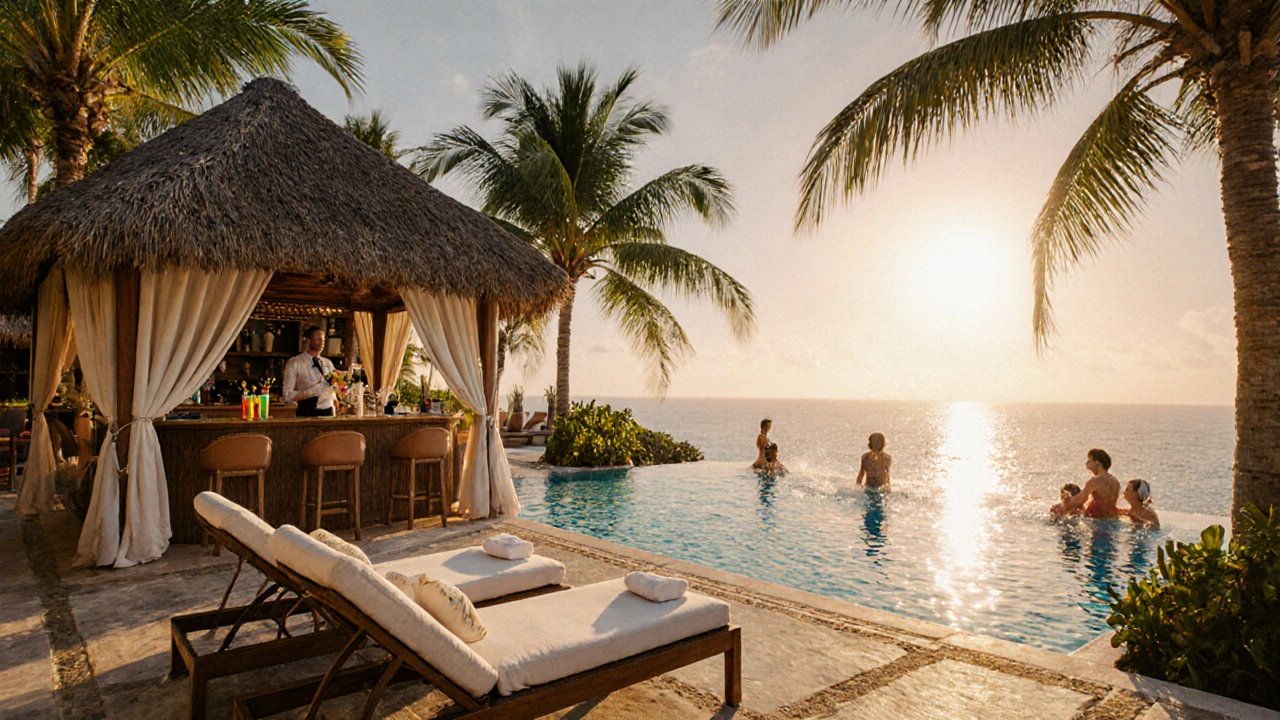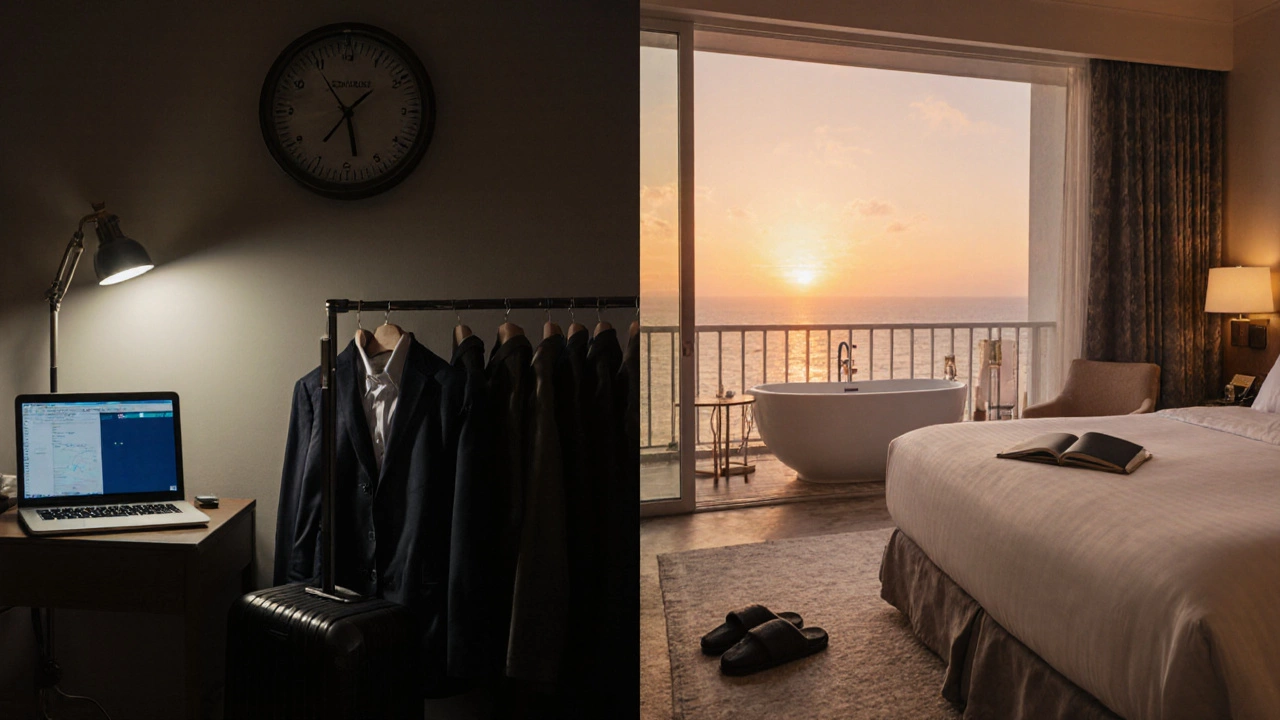Business Hotel or Resort Finder
Find Your Perfect Stay
Answer a few quick questions to determine if you should book a business hotel or a resort for your next trip.
When you’re booking a place to stay, you might find yourself staring at two very different options: a business hotel and a resort. They both have beds, Wi-Fi, and bathrooms-but that’s where the similarities end. Choosing the wrong one can turn a productive trip into a frustrating mess-or ruin a well-deserved break. So what really sets them apart?
Business Hotels Are Built for Work, Not Play
Business hotels are designed around one goal: helping you get work done efficiently. You’ll find them near airports, downtown business districts, or along major highways. Their layout is simple-rooms are compact but clean, desks are sturdy and well-lit, and the Wi-Fi doesn’t drop mid-Zoom call. Many offer 24-hour business centers with printers, scanners, and private meeting rooms you can book by the hour.Take a typical business hotel like the Hampton Inn or Holiday Inn Express. Rooms usually have a desk chair that doesn’t sink after 10 minutes, a coffee maker that actually brews hot coffee, and outlets positioned where your laptop needs them. Breakfast is often included-not because they’re trying to spoil you, but because you’re probably rushing out the door by 6:30 a.m. and need fuel fast.
These hotels don’t waste space on pools, spas, or game rooms. Why? Because their guests aren’t there to relax. They’re there to attend meetings, finish reports, or catch a flight at 5 a.m. The staff know this. They don’t hand out beach towels or organize sunset yoga. They hand you a printed receipt, confirm your shuttle pickup, and ask if you need an extra pillow.
Resorts Are Built to Keep You From Leaving
Resorts, on the other hand, are engineered to make you forget you have a job. They’re usually in scenic locations-beaches, mountains, tropical islands-and they’re packed with amenities designed to keep you entertained for days. Think multiple swimming pools, private cabanas, spas with full treatment menus, kids’ clubs, nightly entertainment, and restaurants that don’t close until midnight.At a resort like the All-Inclusive Sandals or a Four Seasons property, your room might be beautiful, but it’s just the starting point. You’ll find golf courses, snorkeling gear, cooking classes, and even in-room massage services. Breakfast, lunch, dinner, snacks, and drinks are often all included in the price. You don’t need to leave the property for anything-not even a cab ride to the nearest town.
Resorts cater to people who want to unplug. Their staff are trained to anticipate your needs before you voice them. If you mention you like mango smoothies, they’ll have one waiting by the pool tomorrow. If your kids are bored, there’s a treasure hunt starting in 20 minutes. The goal isn’t efficiency-it’s immersion.
Who Should Stay Where?
If you’re traveling for work and need to be productive, a business hotel is your only smart choice. You’ll save time, avoid distractions, and get back to your team faster. Need to hop on a call at 8 p.m.? Business hotels have quiet rooms and reliable internet. Need to print 50 copies of a contract at midnight? They’ll help you without asking why.But if you’re on vacation, and your idea of relaxation is lounging by a pool with a cocktail while your kids splash in the shallow end, a resort is the way to go. You’ll pay more, but you’re not just paying for a room-you’re paying for a full experience. No need to plan meals, no need to rent a car, no need to figure out where to go next. Everything is right there.
Here’s the trap: people sometimes book resorts for business trips because they look luxurious. Big mistake. You’ll end up spending half your day walking through endless hallways looking for a quiet place to take a call. Or worse-you’ll get distracted by the beach volleyball tournament happening next to your room.
Conversely, booking a business hotel for a romantic getaway feels cold and impersonal. No candlelit dinner. No turndown service. No view of the ocean. Just a desk, a TV, and a breakfast buffet that closes at 10 a.m.

Room Differences: Function Over Flair
Business hotel rooms are built for utility. Bed sizes are usually queen or double-large enough to sleep two, but not meant for sprawling out. Furniture is minimal: bed, desk, chair, small closet, TV. The bathroom might be small, but it’s spotless. You won’t find bathrobes, slippers, or fancy toiletries unless it’s a premium business brand like The Ritz-Carlton’s business wing.Resort rooms, even standard ones, are designed to feel like a retreat. King beds with high-thread-count linens, balconies with ocean views, deep soaking tubs, and full-size bottles of luxury shampoo are standard. Many have separate sitting areas, minibars stocked with premium snacks, and even espresso machines. The goal isn’t just comfort-it’s indulgence.
Amenities That Make or Break Your Trip
Here’s a quick breakdown of what you’ll actually find at each:| Amenity | Business Hotel | Resort |
|---|---|---|
| Wi-Fi | Fast, reliable, often free | Fast, but not always prioritized |
| Breakfast | Simple, included, quick | Buffet-style, diverse, often all-day |
| Meeting Rooms | Available, bookable, tech-equipped | Usually not available or poorly equipped |
| Pools | One small pool, if any | Multiple, heated, with swim-up bars |
| Spa & Wellness | None or small fitness center | Full-service spa, yoga, massage |
| Dining Options | One restaurant, maybe a bar | 3-7 restaurants, 24-hour room service |
| Entertainment | TV, maybe a game room | Nightly shows, live music, kids’ clubs |
| Location | Downtown, airport, near offices | Beach, mountains, isolated, scenic |
Notice anything missing? Business hotels don’t offer room service with 10-course menus. Resorts don’t offer printing services for legal documents. Each is built for a different rhythm of life.

Cost Isn’t Just About Price-It’s About Value
A business hotel might cost $150 a night. A resort might cost $500. At first glance, the resort seems overpriced. But if that $500 includes five meals, two spa treatments, snorkeling gear, and a private beach cabana, you’re not paying for a room-you’re paying for a week’s worth of experiences bundled together.Business hotels are cheaper because they strip away the extras. You pay for a place to sleep, a place to work, and maybe a coffee in the morning. That’s it. No frills. No fluff. Just what you need to get through your trip.
Here’s a rule of thumb: if your trip is 2-3 days and you’re working 10+ hours a day, choose the business hotel. If you’re taking a week off and want to wake up without checking your email, go for the resort.
What Happens When You Mix Them Up?
I’ve seen it happen too many times. A client books a resort for a three-day sales conference. They’re stuck trying to find a quiet corner to take a call-every lounge is full of families playing board games. The Wi-Fi crashes during a client demo because five people are streaming Netflix in the next room. They end up paying $400 a night and still can’t get a decent meeting space.On the flip side, a couple books a business hotel for their anniversary. They expect candlelight, a bottle of wine on arrival, and a view of the sunset. Instead, they get a fluorescent-lit room with a desk that wobbles. They leave disappointed-not because the hotel was bad, but because it wasn’t meant for them.
It’s not about quality. It’s about alignment. Your stay should match your purpose.
Bottom Line: Know Your Why
Ask yourself before you book: Why am I here?If your answer is: I need to close a deal, catch up on emails, and be back at the office by Monday-then pick a business hotel. You’ll save time, money, and stress.
If your answer is: I need to forget my inbox exists, unwind, and make memories-then pick a resort. You’ll come back refreshed, not exhausted.
There’s no right or wrong choice. But there’s a right choice for your situation. Don’t let the pool fool you. Don’t let the desk fool you. Know your purpose-and book accordingly.
Can I use a resort for a business trip?
You can, but it’s rarely practical. Resorts are designed for leisure, not productivity. Quiet workspaces are rare, Wi-Fi can be unreliable during peak hours, and the environment is full of distractions-kids playing, live music, poolside events. Unless you’re on a very relaxed, extended trip with minimal meetings, a resort will make it harder to get work done.
Are business hotels boring?
They’re not designed to be exciting-they’re designed to be efficient. If you’re looking for nightlife, spas, or beach access, yes, they’ll feel dull. But if you need a clean room, fast Wi-Fi, and a desk that doesn’t wobble, they’re perfect. Think of them as a tool, not a destination.
Do resorts offer business services?
Some luxury resorts do offer meeting rooms or business centers, but they’re usually expensive add-ons and not as well-equipped as business hotels. You might find a printer, but not a video conferencing setup with dedicated IT support. Don’t assume a resort can handle your corporate needs unless you confirm it in advance.
Is it worth paying more for a resort?
Only if your goal is relaxation and experience. If you’re paying $500 a night and using it like a hotel-just sleeping and checking email-you’re wasting money. But if you’re using the spa, eating at multiple restaurants, and enjoying the activities, the value adds up fast. It’s about how you use it, not just the price tag.
Can I book a business hotel for a vacation?
You can, but you’ll miss out on the experience. Business hotels don’t have pools with swim-up bars, private beach access, or nightly entertainment. If you’re looking for a getaway, you’ll feel like you’re staying in an office annex. Save your vacation budget for a place built to help you unwind.
If you’re planning your next trip, remember: your accommodation should serve your purpose-not distract from it. A business hotel isn’t a downgrade-it’s a smart choice. A resort isn’t a luxury-it’s a lifestyle. Choose based on what you need, not what looks nice on Instagram.
